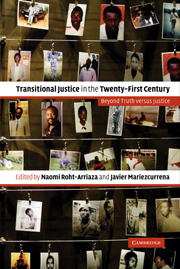Book contents
- Frontmatter
- Contents
- List of contributors
- Acknowledgments
- The new landscape of transitional justice
- Part I Truth, justice, and multiple institutions
- Introduction to Part I
- 1 The Sierra Leone Truth and Reconciliation Commission
- 2 Transitional criminal justice in Sierra Leone
- 3 The Peruvian Truth and Reconciliation Commission and the challenge of impunity
- 4 The “Mexican solution” to transitional justice
- 5 No justice, no peace: Discussion of a legal framework regarding the demobilization of non-state armed groups in Colombia
- 6 Hybrid attempts at accountability for serious crimes in Timor Leste
- Part II Levels of justice: Local, national and international
- Index
6 - Hybrid attempts at accountability for serious crimes in Timor Leste
Published online by Cambridge University Press: 05 June 2012
- Frontmatter
- Contents
- List of contributors
- Acknowledgments
- The new landscape of transitional justice
- Part I Truth, justice, and multiple institutions
- Introduction to Part I
- 1 The Sierra Leone Truth and Reconciliation Commission
- 2 Transitional criminal justice in Sierra Leone
- 3 The Peruvian Truth and Reconciliation Commission and the challenge of impunity
- 4 The “Mexican solution” to transitional justice
- 5 No justice, no peace: Discussion of a legal framework regarding the demobilization of non-state armed groups in Colombia
- 6 Hybrid attempts at accountability for serious crimes in Timor Leste
- Part II Levels of justice: Local, national and international
- Index
Summary
Introduction
We are all here to build a high quality of justice - this Special Panel takes part in the building of international justice and hereby the international community to stop impunity.
[T]he objective of prosecuting and punishing the perpetrators of the serious crimes committed in East Timor in 1999 is to avoid impunity and thereby to promote national reconciliation and the restoration of peace.
After twenty-four years of illegal military occupation by Indonesia, in late 1999 East Timor emerged into a transition period of United Nations administration for two and a half years. Recovery from the violence and devastation wrought by the departing Indonesian forces was not yet complete when the new nation of the Democratic Republic of Timor Leste was declared on May 20, 2002. During the intervening period, the first trial for crimes against humanity committed by pro-Indonesia militia members took place before Timor Leste's Special Panels for Serious Crimes in the capital Dili, opening and closing with the grand aspirations described in the above quotations. Like Sierra Leone and other states described in this volume, Timor Leste adopted a twin track to the question of accountability and reconciliation with the country's difficult past, combining retributive and restorative justice through criminal trials as well as a Commission for Reception, Truth and Reconciliation (CAVR). Simultaneously, neighboring Indonesia has now conducted its own trials for crimes committed in 1999 in Timor Leste, through its Ad Hoc Human Rights Court.
- Type
- Chapter
- Information
- Transitional Justice in the Twenty-First CenturyBeyond Truth versus Justice, pp. 143 - 170Publisher: Cambridge University PressPrint publication year: 2006
- 1
- Cited by



